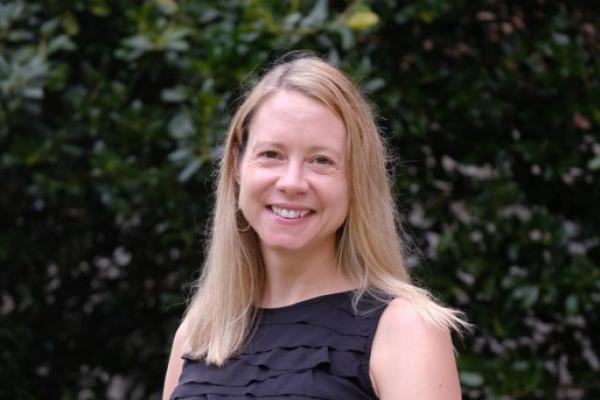
FPG Profile: Jessica Amsbary
Jessica Amsbary, PhD, is a technical assistance specialist at the UNC Frank Porter Graham Child Development Institute (FPG) where she engages in research and development related to STEM innovations for young children with disabilities and supporting provider and family use of evidence-based practices for toddlers with autism. Her primary research is focused on family support initiatives related to very young children with autism and other developmental delays and applying principles of implementation science to ensure early interventions are meeting the needs of families and their children.
As part of our FPG profile series, we recently spoke with Amsbary to learn more about her work here at the Institute. Here’s what she had to say.
Tell us a bit about your professional journey―how did you become a TA specialist and what brought you to FPG?
I worked for many years in early intervention and found myself wanting to be more involved in research, development, and implementation of evidence-based practices, especially those that involve empowering families and caregivers as part of the model. When I completed my PhD at UNC, the stars aligned and STEMIE was newly funded and searching for postdocs. This was a great opportunity for me to bring research and practice worlds together with a goal to include all children and families in meaningful STEM learning experiences.
Describe a typical workday and tell us about the projects you're currently working on.
Like many of us, I think, since the Covid pandemic, the majority of my days are spent in little Zoom squares. I work on a number of projects related to STEMIE including developing presentations, manuscripts, and resources for practitioners and families to support inclusive STEM. I also spend some of my time working on modules for early intervention providers to learn and use evidence-based practices with toddlers with autism and families they serve. I am in the process of seeking funding to conduct some pilot implementation studies on dissemination of these modules. Finally, I coordinate the master’s degree for experienced teachers program in early childhood intervention and family support in the School of Education. I really enjoy that aspect of my job as well―teaching and mentoring early childhood practitioners to purposefully embed family-centered, culturally responsive, and high-quality inclusive practices in their work is very rewarding!
What do you like most about your job?
I think what I like most about my job is the support that surrounds me at every turn. I am so lucky to be working with many teams consisting of strong and successful mentors, all of whom seem to be interested in supporting me in my “early career” stage of academia.
What do you find most challenging?
The relatively frequent rejections that come with grant writing are quite challenging to me. Especially in a role that is dependent upon funding, it is frustrating when you have a great idea and really want to do the work but are unable to find the funding to do it.
How does your work further the mission of FPG?
The work I am doing is all focused on FPG’s mission of transforming children’s lives through innovations in research, practice, and policy. I really strive to conduct authentic community engaged projects and TA activities that are meaningful and beneficial to those intended to use them. My focus on family and caregiver perspectives and family and caregiver partnerships is critical in supporting all young children to reach optimal outcomes.
What do you hope to have accomplished five years from now?
Five years from now, I hope to be a PI on projects that focus on implementation supports and practices to ensure all practitioners and families/caregivers are able to access, use, and benefit from evidence-based practices. I hope to continue writing manuscripts, grant proposals, modules, and additional resources in efforts to disseminate accessible and relevant information to support all children and families.
Is there anything else you would like our readers to know about working at FPG?
I guess just that it’s a great group of people who all are working hard to help others―a great place to be!
